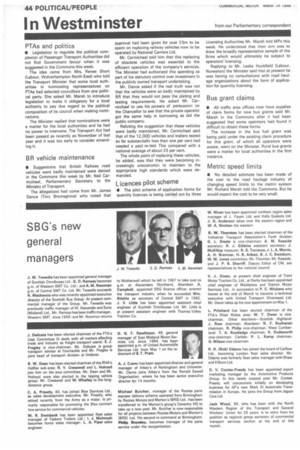I n Westminster from our Parliamentary correspondent
Page 46

If you've noticed an error in this article please click here to report it so we can fix it.
PTAs and politics
• Legislation to regulate the political complexion of Passenger Transport Authorities did not find Government favour when it was suggested in the Commons this week.
The idea came from Mrs. Renee Short (Labour, Wolverhampton North East) who told the Transport Minister that some local authorities in nominating representatives on PTAs had selected councillors from one political party. She asked Mr. Marsh to introduce legislation to make it obligatory for a local authority to pay due regard to the political composition of its council when making nominations.
The Minister replied that nominations were a matter for the local authorities and he had no power to intervene. The Transport Act had been passed as recently as November of last year and it was too early to consider amending it.
BR vehicle maintenance
• Suggestions that British Railway road vehicles were badly maintained were denied in the Commons this week by Mr. Neil Carmichael, Parliamentary Secretary to the Ministry of Transport.
The allegations had come from Mr. James Dance (Tory Bromsgrove) who noted that
approval had been given for over £5m to be spent on replacing railway vehicles now to be operated by National Carriers Ltd.
Mr. Carmichael told him that this replacing of obsolete vehicles was essential to the efficient operation of the company's services. The Minister had authorized this spending as part of his statutory control over investment in the publicly owned transport undertaking.
Mr. Dance asked if the real truth was not that the vehicles were so badly maintained by BR that they would not pass the plating and testing requirements. He asked Mr. Carmichael to use his powers of persuasion on the Chancellor to see that the private operator got the same help in borrowing as did the public company.
Refuting the suggestion that these vehicles were badly maintained, Mr. Carmichael said that of the 12,000 vehicles and trailers tested So far substantially less than one per cent had needed a paid re-test. This compared with a national average of about 25 per cent.
The whole point of replacing these vehicles, he added, was that they were becoming increasingly uneconomic to maintain to the appropriate high standards which were demanded.
L icences pilot scheme
• The pilot scheme of application forms for quantity licences is being carried out by three
Licensing Authorities Mr. Marsh told MPs this week. He understood that their aim was to draw the broadly representative sample of the firms which would ultimately be subject to operators' licensing.
Replying to Mr. Leslie Huckfield (Labour, Nuneaton) the Minister said that at present he was having no consultations with road haulage organizations about the form of application for quantity licensing.
Bus grant claims
• All traffic area offices now have supplies of claim forms for new bus grants said Mr. Marsh in the Commons after it had been suggested that some operators had found it difficult to obtain these forms.
The increase in the bus fuel grant was being paid under the existing claim procedure for this grant, of which all operators were aware, went on the Minister. Rural bus grants were a matter for local authorities in the first instance.
Metric speed limits
• No detailed estimate has been made of the cost to the road haulage industry of changing speed limits to the metric system Mr. Richard Marsh told the Commons. But he would expect the cost to be very small.




















































































































